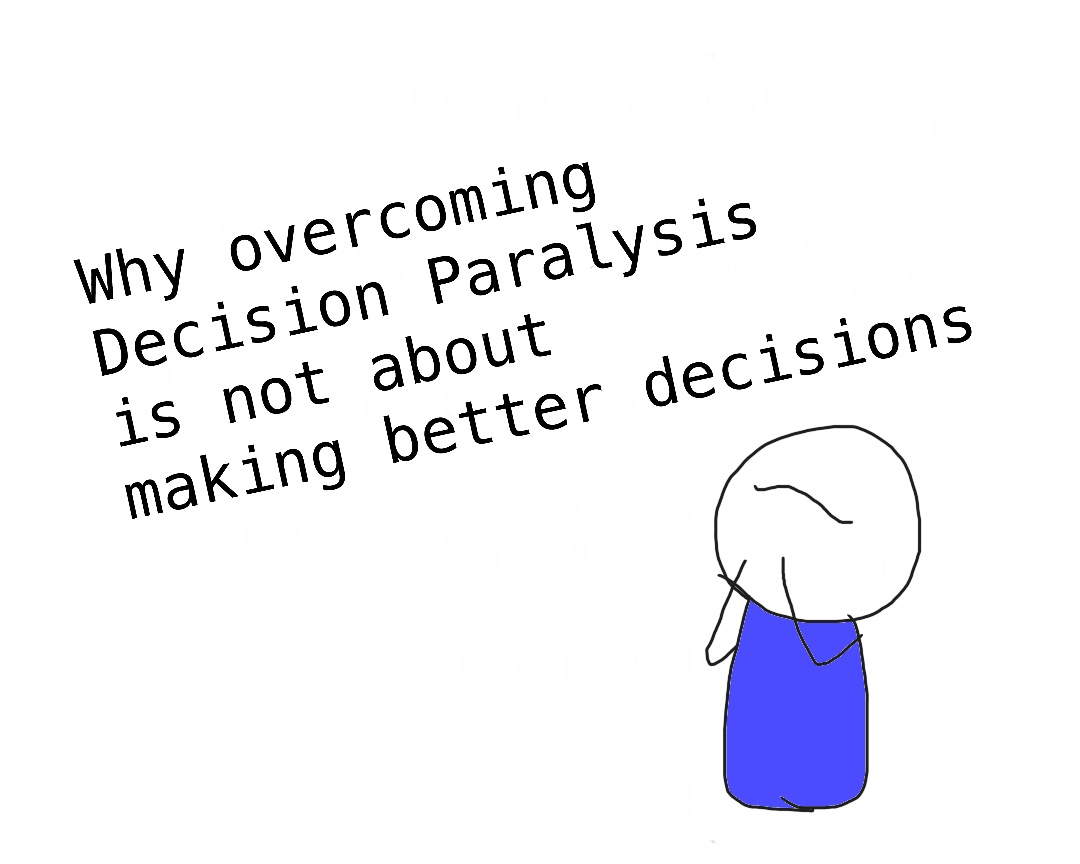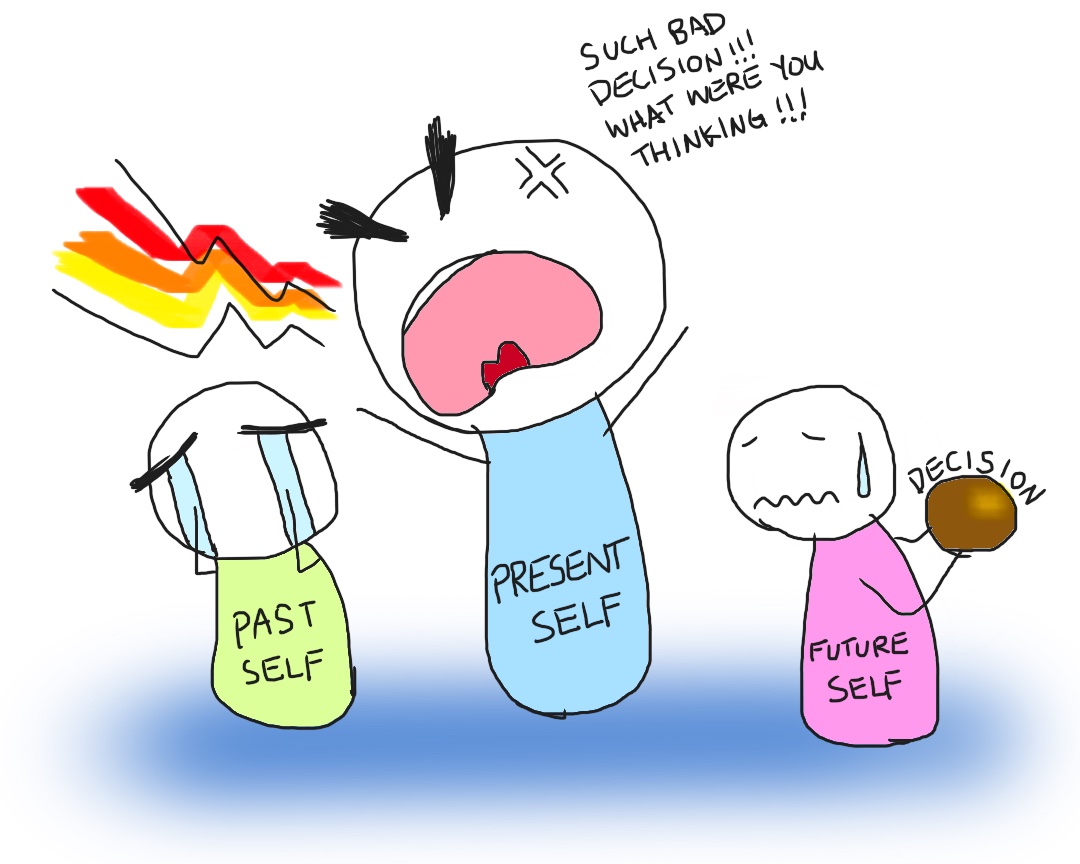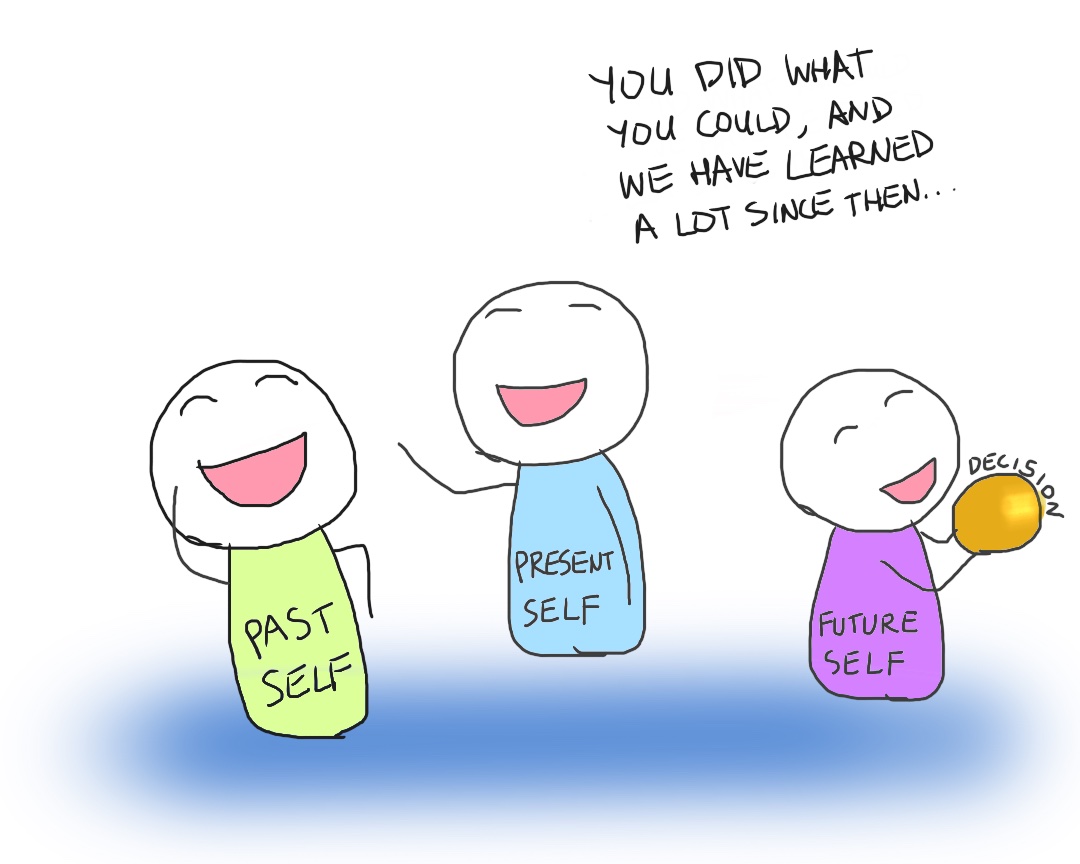
Are you struggling with decision paralysis and feeling stuck? In today's post, we dive deeper into decision paralysis, and focus on the most important step to overcome it: Acceptance. We introduce the "three-self" framework: past self, present self, and future self. By understanding the relationship amongst these three, we can put ourselves in a growth mindset and make decisions with confidence.
Prelude
Imagine you are in a classroom. It's the first day of the semester. And you are sitting in the front row with other freshmen, watching the professor of Organic Chemistry 101 starting the lecture.
The professor picks on a student and asks, "Tell me, what are the steps involved in the hydration of propene?"
The student is caught off guard. He tries to think back to his high school chemistry class, but he can't remember ever learning about propene. After what seems like an eternity, he finally whimpers, "I don't know."
"Ha! You don't know?!" The professor, with a disdainful smirk, chides sharply.
"It's obvious, if you had paid attention to Chapter 8 of the textbook. Clearly, you haven't put in the effort required to succeed in this course."
The classroom murmurs. Chapter 8? This is the first day of class! It feels unfair for the professor to expect students to know the material before it's been taught!
Now, sitting in this classroom, observing this exchange between the professor and the student, do you imagine you will be motivated to learn? Next time when the professor asks you a question, will you be eager to answer?
Overcoming Decision Paralysis: A Recap
How does this thought experiment relate to decision paralysis?
In a previous article, we described a three-stage framework to overcome decision paralysis. Here is a quick recap:
Before making a decision: Reduction. Ask yourself if the decision can be delegated (to someone else), automated (to a default or a random choice), or deferred (to a later time).
During the decision making process: Optimization. Be aware of your true values and goals, and make a decision that is most aligned with them, to the best of your knowledge.
After making a decision: Acceptance. Remember the following:
- We can't change the past.
- We always know more now than we did before, so don't judge your past self's choices based on present knowledge.
- Remember the rationales behind your past decisions. They reflect your values and goals at the time.
- Be kind to your past self. So that your future self will make choices confidently, without the fear of being criticized.
In the same article, we mentioned very briefly that out of the three stages, Acceptance is the most important one:
"Arguably, the most important key to overcoming decision paralysis is the ability to live with the consequences of your decisions."
We also mentioned the concept of past self, present self, and future self. In today's post, we will dive deeper into these concepts, and how they are the key to overcoming decision paralysis.
Fear of Regret
One of the biggest trigger for decision paralysis is the fear of regret.
What if we make the wrong choice? What if later on, we are unhappy with the consequences of our decision? What if we are going down the wrong path?
The fear of regret mindset is like a straitjacket. It bounds us to indecision and inaction, because we are afraid of making a wrong move.
Ironically, often it's not making the wrong move that limits our potential. It's not trying enough moves. This sends us into a downward spiral of inaction, leading to the lack of result, which creates more regret and inaction.
More importantly, it takes away joy, happiness, and productivity from our lives. That's why to really get at the root of decision paralysis, before even stratigizing how to make the best decision, we need to train ourselves the skill of Acceptance: the healthy mindset to live with the consequences of our choices.
The Three-Self Framework: Past, Present, and Future Selves
How do we escape the straitjacket of fear of regret? We need to recognize the detrimental effect of regret, and how it's limiting our potential.
Let's try to visualize this effect by picturing our past self, present self, and future self. These three selves are actually constantly interacting and shaping each other. Let's take a look at the following illustrations:

Above: Just a title card; please keep scrolling.

Above: When we chide our past self for a bad decision, our future self is watching, and will become more fearful of making decisions.

Above: If we treat our past self fairly, our future self will be more confident in making decisions.
It's important to recognize that we always know more now than we did before. So scolding our past self for a bad decision using present knowledge is unfair. It's just like how it's unfair for the professor to scold the student for not knowing the material before it's been taught.
At the same time, when our present self scolds our past self, our future self is watching. Just like the rest of the classroom, our future self will be less motivated to learn by trying, and less eager to answer questions and face challenges. This is the fear of regret mindset.
(Yes, plot twist!!! In the classroom analogy, we are actually playing all the roles -- what is this, Fight Club!? Our past self is the student being chided unfairly. Our present self is the professor having unreasonable expectations. And the rest of the class is our future self, watching the interaction and probably having their enthusiasm for learning dampened.)
The Growth Mindset
So how should the professor change his teaching style to promote learning? How should our present self handle unfavorable outcomes of our past decisions?
We can get a lot of insight from the 2014 report from Professors Dweck, Walton, and Cohen, titled "Academic Tenacity: Mindsets and Skills that Promote Long-Term Learning" (source). In the report, the authors pointed out the importance of the growth mindset: recognition that we are constantly learning and growing, and that our abilities are not fixed.
That's how we should treat our past self: with the growth mindset. We should recognize that because we are constantly learning and growing, we always know more now than we did before. Our past self made the best decisions given the circumsances and knowledge at the time. We have since learned more, from that experience as well as from other experiences. In the future, when making new decisions, we will continue to apply up-to-date knowledge. Moreover, we have the psychological safety to know that even if our choices didn't turn out to be the best, we will not be scolded and chided by ourself.
Exercises to Practice Acceptance
How do we practice the growth mindset? How do we train ourselves to overcome decision paralysis? How do we practice Acceptance?
Here are two exercises that you can try. If you have a new decision to make, try the first exercie. If you are dealing with a past decision, try the second exercise.
Exercise 1: Making a New Decision
If you are making a new decision and you are trapped by the fear of regret, try to write down the following:
- what decision are you making and what are the options
- what information you have relevant to the decision
- what are the values and goals that you are trying to achieve
- which option do you feel is best aligned with your values and goals
This serves as "showing the work" to your future self. It's a way to document that you have done your due diligence, and that you have made the best decision given the information and knowledge at the time. If you feel regret later on, then you know you are behaving like the unreasonable professor.
Exercise 2: Dealing with a Past Decision
If you are dealing with the sense of regret from a past decision, try asking yourself the following questions:
- can I change the past? (the answer, for almost certainly all of us, is no.)
- since I can't change the past, how useful is it to dwell on it?
- how do I make the best of the situation now? (this is the only thing we can control)
- what have I learned from this experience? (write it down, so you can show it to your future self)
Be Happy; Be Productive
Many of us have had the experience of being bound by the fear of regret, struggling to break free. I hope today's article has provided some useful insights, perspectives, and exercises to help you overcome decision paralysis. If anything, recognizing that regret is a form of unfair self-sabotage is already a huge step forward!